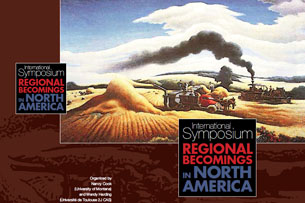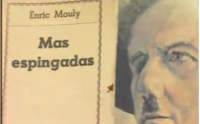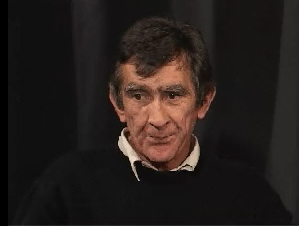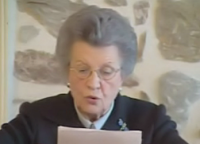Notice
Geographies and Genealogies : Jane Smiley, Marilynne Robinson and Louise Erdrich
- document 1 document 2 document 3
- niveau 1 niveau 2 niveau 3
Descriptif
Geographies and Genealogies: Jane Smiley, Marilynne Robinson and Louise Erdrich / Stacey Olster, in symposium international "Regional Becomings in North America" organisé sous la responsabilité scientifique de Wendy Harding (Cultures Anglo-Saxonnes (CAS), Université Toulouse Jean Jaurès, France) et Nancy Cook (University of Montana,USA), Université Toulouse Jean Jaurès, 7-8 avril 2016.
Session 4 : Region, Gender, Race.
In this era of transnational consciousness and global connectedness, some have asked whether it is still legitimate to consider cultural practices in regional terms. Is regionalism a futile effort to close borders and exclude the alien and the new ? Is it imbued with nostalgia and oriented toward an imaginary past, projecting “setting[s] outside the world of modern development, … zone[s] of backwardness where locally variant folkways still prevail” (Brodhead 115) ? This symposium will consider the extent to which different constructions of region in North American literature, art, music, and other cultural practices could, on the contrary, be viewed in Deleuzian terms as “becoming” regional.
Regionalism has often been coupled with realism, so we can inquire how its cultural formations go beyond imitation. Do regionalist cultural productions record or create their communities ? Do they tend toward idealization—returning to a mythical time and place of innocence—or can they be critical or confrontational ? Does regionalism, as Fetterley and Pryse have argued, make a place for counter-hegemonic discourses ? How do trajectories of deterritorialization and reterritorialization remodel regional identity ? How do expressions of place make room for transformative incursions of difference ? What associations or assemblages come together to produce or promote regional forms ? Finally, to what extent do diverse forms of regionalism, including bioregionalism, undo conceptual divisions between the local and the global ?
Intervention / Responsable scientifique
Thème
Documentation
Bibliographie indicative
Bertens, Johannes Willem., Theo D’. Haen, and Ineke Bockting, eds. ‘Writing’ Nation and ‘writing’ Region in America. Vol. 33. Amsterdam : VU UP, 1996. Print. European Contributions to American Studies.
Brodhead, Richard H. Cultures of Letters : Scenes of Reading and Writing in Nineteenth-century America. Chicago : U of Chicago, 1993. Print.
Campbell, Neil. The Cultures of the American New West. Chicago : Fitzroy Dearborn, 2000. Print.
Campbell, Neil. The Rhizomatic West : Representing the American West in a Transnational, Global, Media Age. Lincoln : U of Nebraska, 2008. Print.
Clifford, James. Routes : Travel and Translation in the Late Twentieth Century. Cambridge, MA : Harvard UP, 1997. Print.
Crow, Charles L., ed. A Companion to the Regional Literatures of America. Oxford : Blackwell, 2003. Print.
Deleuze, Gilles, and Félix Guattari. A Thousand Plateaus : Capitalism and Schizophrenia. Minneapolis : U of Minnesota, 1987. Print.
Fetterley, Judith, and Marjorie Pryse. Writing out of Place : Regionalism, Women, and American Literary Culture. Urbana : U of Illinois, 2003. Print.
Foote, Stephanie. “Local Knowledge and Women’s Regional Writing.” The Cambridge History of American Women’s Literature. Ed. Dale Bauer. Cambridge and New York, 2012.
Frampton, Kenneth. “Towards a Critical Regionalism : Six Points for an Architecture of Resistance.” Postmodern Culture. Ed. Hal Foster. London : Pluto, 1985. 16-30. Print.
Franklin, Wayne, and Michael Steiner. Mapping American Culture. Iowa City : U of Iowa, 1992. Print.
Herr, Cheryl. Critical Regionalism and Cultural Studies : From Ireland to the American Midwest. Gainesville : U of Florida, 1996. Print.
Jones, Karen R., and John Wills. American West : Competing Visions. Edinburgh : Edinburgh UP, 2009. Print.
Jordan, David. New World Regionalism : Literature in the Americas. Toronto : U of Toronto, 1994. Print.
Kollin, Susan. Postwestern Cultures : Literature, Theory, Space. Lincoln : U of Nebraska, 2007. Print.
Lippard, Lucy R. The Lure of the Local : Senses of Place in a Multicentered Society. New York : New, 1997. Print.
Mahoney, Timothy R., and Wendy J. Katz, eds. Regionalism and the Humanities. Lincoln : U of Nebraska, 2008. Print
McGinnis, Michael Vincent, ed. Bioregionalism. London : Routledge, 1999. Print.
Powell, Douglas Reichert. Critical Regionalism : Connecting Politics and Culture in the American Landscape. Chapel Hill : U of North Carolina, 2007. Print.
Soja, Edward W. Postmodern Geographies : The Reassertion of Space in Critical Social Theory. London : Verso, 1989. Print.
Thayer, Robert L. LifePlace : Bioregional Thought and Practice. Berkeley : U of California, 2003. Print.
Wilson, Chris, and Paul Erling. Groth, eds. Everyday America : Cultural Landscape Studies after J.B. Jackson. Berkeley : U of California, 2003. Print.
Dans la même collection
-
Always Becoming Bioregional / Tom Lynch
LynchTomAlways Becoming Bioregional / Tom Lynch, in symposium international "Regional Becomings in North America" organisé, sous la responsabilité scientifique de Wendy Harding (Cultures Anglo-Saxonnes (CAS)
-
Evolution of the Ecotopian Myth in the Pacific Northwest into a Culture of Sustainability / Steven …
JohnsonSteven ReedEvolution of the Ecotopian Myth in the Pacific Northwest into a Culture of Sustainability / Steven Reed Johnson, in symposium international "Regional Becomings in North America" organisé, sous la
-
Cascadia: Emergence of a Bioregional Culture in the Pacific Northwest / Julie Celnik
CelnikJulieCascadia: Emergence of a Bioregional Culture in the Pacific Northwest / Julie Celnik, in symposium international "Regional Becomings in North America" organisé, sous la responsabilité scientifique de
-
Playing Pioneer Woman / Margaret D. Jacobs
JacobsMargaret D.Playing Pioneer Woman / Margaret D. Jacobs, in symposium international "Regional Becomings in North America" organisé sous la responsabilité scientifique de Wendy Harding (Cultures Anglo-Saxonnes (CAS
-
Going Local and Getting Personal: Toward a Regional Reading Practice / Nancy Cook
CookNancyGoing Local and Getting Personal: Toward a Regional Reading Practice / Nancy Cook, in symposium international "Regional Becomings in North America" organisé sous la responsabilité scientifique de
-
Jayne Anne Phillip’s Poetic Reinvention of Appalachia in MotherKind / Sarah Dufaure
DufaureSarahJayne Anne Phillip’s Poetic Reinvention of Appalachia in MotherKind / Sarah Dufaure, in symposium international "Regional Becomings in North America" organisé sous la responsabilité scientifique de
-
Becoming Californian through Travel and Writing, Friendship and Patronage / Cathryn Halverson
HalversonCathrynBecoming Californian through Travel and Writing, Friendship and Patronage / Cathryn Halverson, in symposium international "Regional Becomings in North America" organisé sous la responsabilité
-
Notes from California’s Native Daughters / Audrey Goodman
GoodmanAudreyNotes from California’s Native Daughters / Audrey Goodman, in symposium international "Regional Becomings in North America" organisé sous la responsabilité scientifique de Wendy Harding (Cultures
Sur le même thème
-
Always Becoming Bioregional / Tom Lynch
LynchTomAlways Becoming Bioregional / Tom Lynch, in symposium international "Regional Becomings in North America" organisé, sous la responsabilité scientifique de Wendy Harding (Cultures Anglo-Saxonnes (CAS)
-
Going Local and Getting Personal: Toward a Regional Reading Practice / Nancy Cook
CookNancyGoing Local and Getting Personal: Toward a Regional Reading Practice / Nancy Cook, in symposium international "Regional Becomings in North America" organisé sous la responsabilité scientifique de
-
Jayne Anne Phillip’s Poetic Reinvention of Appalachia in MotherKind / Sarah Dufaure
DufaureSarahJayne Anne Phillip’s Poetic Reinvention of Appalachia in MotherKind / Sarah Dufaure, in symposium international "Regional Becomings in North America" organisé sous la responsabilité scientifique de
-
Notes from California’s Native Daughters / Audrey Goodman
GoodmanAudreyNotes from California’s Native Daughters / Audrey Goodman, in symposium international "Regional Becomings in North America" organisé sous la responsabilité scientifique de Wendy Harding (Cultures
-
Escapade avec Henri Mouly
GinestetJoëlleMoulyEnricEspingadas amb Enric Mouly est composé de lectures de chapitres d'un ouvrage de souvenirs d'une enfance rurale en Rouergue, "Mas Espingadas" publié en 1933 à Rodez et en 2000 par le Grelh Roergàs. Les
-
Rencontre avec le poète Jacques Privat
GinestetJoëllePrivatJaumesCe programme vidéo nous fait découvrir le poète occitan Jaumes Privat qui nous parle de ses recueils "Talhs" et "L'Ombra un Fum" ainsi que de son parcours de poète et de plasticien. Générique
-
Henri Mouly, par sa fille
GinestetJoëlleUne conférence de la fille de l'auteur occitan Henri Mouly, né à Compolibat (Aveyron, Midi-Pyrénees) en 1896. Mireille Pelras nous présente une biographie de l'auteur et met en évidence son parcours d












